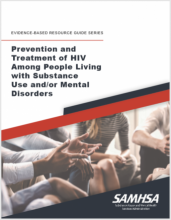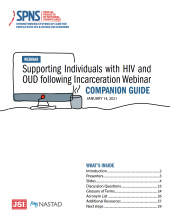
This resource describes how state health departments and other public health organizations can partner with people with HIV and/or who use(d) drugs in programmatic and policy making processes and evaluation.



This resource describes how state health departments and other public health organizations can partner with people with HIV and/or who use(d) drugs in programmatic and policy making processes and evaluation.
Individuals who have HIV who also use drugs experience increased age-matched morbidity and mortality in comparison with those with HIV who do not use drugs.
This month’s Connecting Care episode discusses the impact of structural racism at the intersection of HIV and OUD care and opportunities to think outside of the box to effect change.
For Boston Health Care for the Homeless nurse Megan Sonderegger, providing client-centered care means literally meeting her clients where they are.
There are so many factors that impact adherence and health outcomes. During this Connecting Care podcast, Drs. Alex Walley, Jessica Taylor, and Sim Kimmel discuss HIV prevention and treatment among people who inject drugs.
COVID-19 has changed the way society operates in countless ways. During our inaugural podcast, our team of addiction specialists and HIV providers, Drs.
This virtual session summary describes key takeaways from the August 2020 Let's Talk about SSPs as Essential Services conversation.
Developed as part of the Strengthening Systems of Care for People with HIV and Opioid Use Disorder project, this document contains brief descriptions of federal policy and systems changes due to coronavirus 2019 (COVID-19) that relate to the HIV and substance use systems of care, along w
This document provides an overview of the SAMHSA State Opioid Response (SOR) Funding Opportunity Announcement (FOA) TI-20-012 for fiscal year (FY) 2020, with a specific focus on incorporating strategies to address HIV/infectious diseases, harm reduction, and stimulant use.